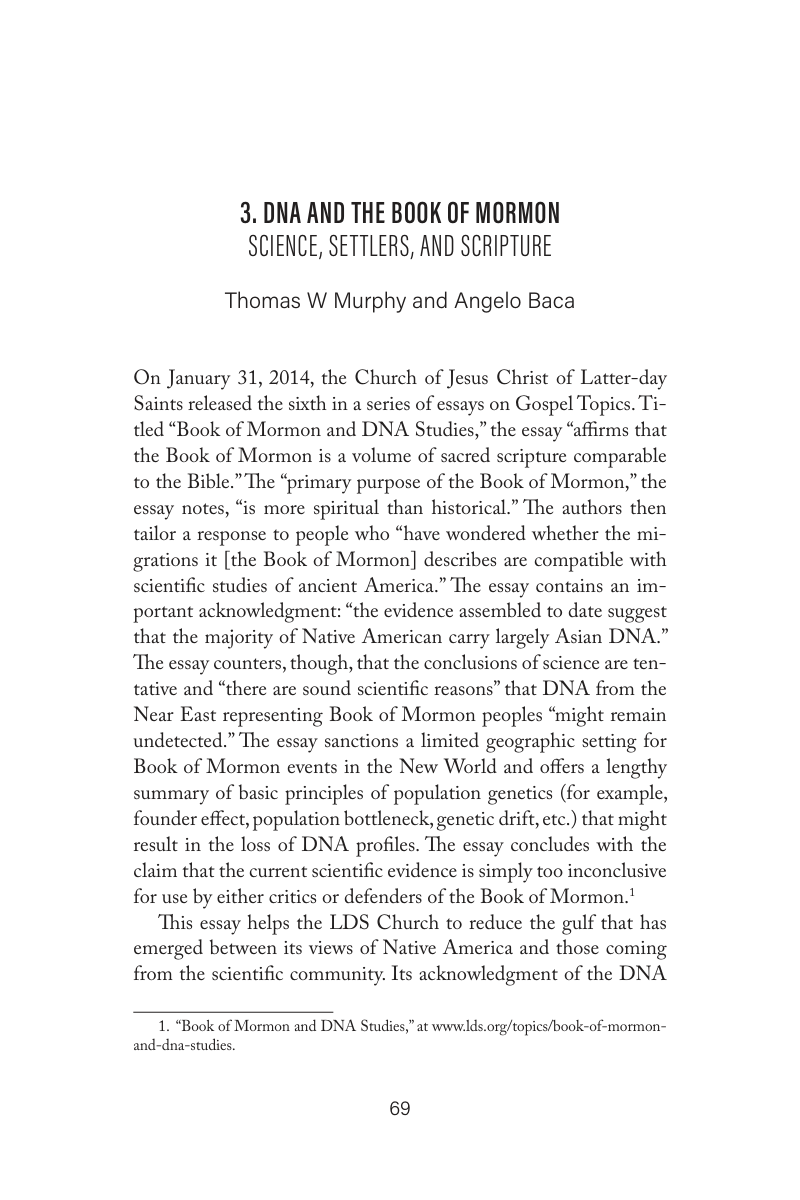2020 article by Thomas W. Murphy and Angelo Baca responding to (and criticizing) the LDS Church Gospel Topics essay.
- Type
- Book
- Hearsay
- Direct
- Reference
Thomas W. Murphy and Angelo Baca, "DNA and the Book of Mormon: Science, Settlers, and Scripture," in The LDS Gospel Topics Series: A Scholarly Engagement, ed. Matthew L. Harris and Newell G. Bringhurst (Salt Lake City: Signature Books, 2020), 69–95
- Scribe/Publisher
- Signature Books
- Audience
- Reading Public
- Transcription
On January 31, 2014, the Church of Jesus Christ of Latter-day Saints released the sixth in a series of essays on Gospel Topics. Titled “Book of Mormon and DNA Studies,” the essay “affirms that the Book of Mormon is a volume of sacred scripture comparable to the Bible.” The “primary purpose of the Book of Mormon,” the essay notes, “is more spiritual than historical.” The authors then tailor a response to people who “have wondered whether the migrations it [the Book of Mormon] describes are compatible with scientific studies of ancient America.” The essay contains an important acknowledgment: “the evidence assembled to date suggest that the majority of Native American carry largely Asian DNA.” The essay counters, though, that the conclusions of science are tentative and “there are sound scientific reasons” that DNA from the Near East representing Book of Mormon peoples “might remain undetected.” The essay sanctions a limited geographic setting for Book of Mormon events in the New World and offers a lengthy summary of basic principles of population genetics (for example, founder effect, population bottleneck, genetic drift, etc.) that might result in the loss of DNA profiles. The essay concludes with the claim that the current scientific evidence is simply too inconclusive for use by either critics or defenders of the Book of Mormon.
This essay helps the LDS Church to reduce the gulf that has emerged between its views of Native America and those coming from the scientific community. Its acknowledgment of the DNA indicating an Asian origin of Native Americans is a positive step forward for the LDS Church. The emphasis on the importance of the spirituality of scripture over historicity is particularly noteworthy. The words of caution issued to both defenders and critics of the Book of Mormon are likewise praiseworthy. The essay struggles, though, to escape fully settler colonialist thinking and to bridge the gap between science and scripture. The essay fails to address adequately Indigenous perspectives on either the science or the scripture.
In our reflections on this essay, we employ a decolonizing methodology to help bring to the forefront Indigenous perspectives on DNA and the Book of Mormon.2 We consider the LDS Church’s essay, not just within the context of new scientific insights into Native American origins, but also within the context of what settler colonial Mormons and Native Americans say about each other. Raised in the LDS Church with Indigenous heritage, both of us learned from an early age that we should aspire to become “white and delightsome.” Due to intermarriage over multiple generations, one of us—Murphy—may appear closer to that than the other. When we read the Book of Mormon, we encounter conflicting messages. On the one hand, the scripture teaches that “all are alike unto God,” yet it also represents dark skin as a curse from God for the wickedness of our ancestors and promises a removal of the curse, and thereby a return to whiteness, in return for righteous behavior. This conflicting message has its roots in the colonial ideology that attributed ancient American civilizations to white immigrants from Israel who had purportedly been destroyed by the ancestors of the American Indians. In the twenty-first century, despite abundant evidence refuting that view, it remains difficult for white audiences to hear Native voices even when speaking about the origins of our own ancestors. As we read the forthright acknowledgments coming from the church’s DNA essay, we see an opportunity, yet to be fully realized, for Latter-day Saints to disrupt the older settler narratives that have privileged the authority of colonizers over the bodies and voices of the colonized.
- Source Link
- https://www.academia.edu/60074444/DNA_and_the_Book_of_Mormon_Science_Settlers_and_Scripture
- Citations in Mormonr Qnas
The B. H. Roberts Foundation is not owned by, operated by, or affiliated with the Church of Jesus Christ of Latter-day Saints.

